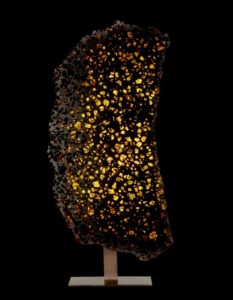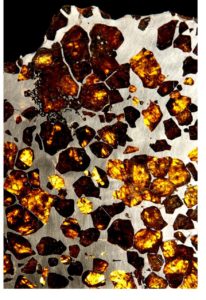
The Fukang meteorite, a stunningly beautiful and incredibly valuable celestial visitor, is a testament to the awe-inspiring power of the universe and the mysteries it holds. Its discovery in the year 2000 by a hiker in the Fukang Mountains of China marked a landmark moment in the world of meteorite studies.
A Cosmic Time Capsule:
This remarkable meteorite is a pallasite, a rare type of stony-iron meteorite. Its most striking feature is its mesmerizing beauty, characterized by translucent olivine crystals embedded within a nickel-iron matrix. The olivine crystals, often referred to as “peridot” when found on Earth, sparkle with a vibrant green color, creating a breathtaking spectacle reminiscent of a starry night sky.
A Journey Through Time:
The Fukang meteorite is estimated to be 4.5 billion years old, dating back to the very beginnings of our solar system. It represents a cosmic time capsule, carrying within its structure valuable information about the formation and evolution of our planet and its neighbors. Studying the composition and structure of this ancient object allows scientists to unravel secrets about the early universe and the processes that led to the formation of Earth.
A Global Treasure:
The Fukang meteorite is not only scientifically significant but also incredibly valuable. Weighing in at a massive 1003 kilograms, it is one of the largest pallasite meteorites ever discovered. Its unique beauty and rarity have made it highly sought after by collectors and institutions worldwide. Estimates place its value at a staggering $40 per gram, bringing its total worth to an estimated $17 million.
A Glimpse of the Cosmos:
The Fukang meteorite serves as a reminder of the vastness of the universe and the incredible wonders it holds. It is a tangible connection to the origins of our solar system, a celestial artifact that captures the imagination and inspires a sense of awe and wonder. Its discovery and subsequent appreciation as a scientific and artistic treasure demonstrate the enduring fascination with the cosmos and the constant search for knowledge and beauty in the universe.

 Pazionmedia.com Pazion Media l Latest News l Politics l Sports l Entertainment
Pazionmedia.com Pazion Media l Latest News l Politics l Sports l Entertainment



